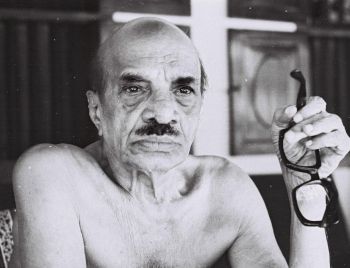
The Limitless Instant: The Life, Work and Revolution of Vaikom Muhammad Basheer
Muhammad Basheer of Vaikom (commonly known as Vaikom Muhammad Basheer or the Beypore Sultan) needs little introduction. As a writer, he is remembered for his cutting and incisive attacks on political, social and religious malpractices, his rhythmic, lyrical and evocative prose, and his revolutionary use of common idioms and conversationalist rhetoric.
There can be no mention of Basheer without mention of revolution. He was as much a product of his revolutionary times as he is a product of his rebellious spirit. It was, perhaps, the potent marriage of the two that gave birth to his unique genius.
Given the strong political and philosophical undercurrents of Basheer’s work, it is essential to understand his oeuvres in the context of the social and political change in Kerala that preceded him, to which he found himself often responding:
Basheer, Narayana Guru and the Kerala Literary Renaissance
Basheer’s visage and prose verse have become synonymous with Kerala’s famous egalitarian renaissance that began with Narayana Guru’s social revolution at the end of the 19th century. As such, he was not only one of the leading figures of Kerala’s acclaimed Literary Renaissance, which took place in the first half of the 20th century, but additionally, he was a direct beneficiary and descendent of the seminal political and social egalitarian revolution that was fought in Kerala under Guru, a revolutionary social leader.
On considerably scant financial resources, Kerala has achieved social indicators on par with some of the world’s most developed and wealthy nations. Most scholars recognize this exceptional phenomenon as the direct result of the social revolution fought by Narayana Guru during the second half of the 19th century. This revolution was maintained and rejuvenated by important figures such as Basheer.
Guru crafted the equivalent of a religious and philosophical plain language movement that had a substantial impact on Kerala’s culture and cultural production. Using commonly employed Malayalam and Tamil words, he crafted an entirely new philosophical movement that was based on fundamental human equality and the denial of difference between people. Guru’s ethos was simple: he held that all men are equal in essence and, most importantly, in intellectual capacity. There was no high caste or low caste, and no high culture or low culture. Knowledge was for everyone, and equally attainable by everyone. This ethos had a substantial impact on Basheer and other modernist writers in Kerala.
Before the advent of Narayan Guru, language itself was highly stratified. Words were restricted by caste, class and gender. For example, there was an upper class word for salt and a lower class word for salt. The penalty for lexical transgression for the poor man was often death. There were invisible but unassailable barriers to cultural production. Language was a strong force of social and cultural division, with the cloistering and regulation of Sanskrit and its related episteme at the epi-center of cultural hegemonies. Malayalam-language Arts and Literature were also carefully regulated by complex restrictions on meter, rhythm, and register of language.
Guru’s careful intellectual revolution successfully reversed these divisions. He argued that thinking was the most fundamental and essential characteristic of human beings and, therefore, all human beings must have equal access and right to tools of rigorous reflection. He reinvented mass culture and inculcated it with new philosophical methodologies that depended upon the most common tools of analysis, such as observation and formal description. In so doing, he destroyed the very basis of feudal caste orders, which deemed careful thinking, critical observation, philosophical analysis and pontification as society’s most highly regulated practices. Guru deemed these practices as universal and, there by, opened them up for all people–regardless of social caste or social background.
Guru’s revolution forms the essential backbone of modern Malayalee culture. It was a pre-requisite to the extraordinary social change the state experienced in the last century. Guru’s prolific writings and his plain language movement serve as the essential backdrop for understanding figures such as Basheer who motored the Kerala Literary Renaissance.
Basheer proclaimed that Guru “was the greatest human being, born in India during the last 500 years. We have not understood him properly yet.” Guru’s revolution set the stage for Basheer and his contemporaries to experiment new techniques and modes of linguistic expression, to escape the literary trappings of caste and class, and to pen a new democratic mode of language. As a key member of the Kerala Literary Renaissance, Basheer used his pen to strengthen the growing culture of egalitarianism in Kerala. Through his writings, he brought a sea of change to the landscape of Malayalam Literature.

Basheer, Kerala and the Malayalam Language
Basheer is amongst the world’s greatest modernist writers. No writer understood the tonality and rhythm of spoken language quite as he did. No experience trumps reading him in his original tongue – Malayalam. With Greenberg-esque ferocity, his pen brings language in direct confrontation with its essential materiality.
In addition to a truly contemporary understanding of the social and political context of his writings, Basheer also possessed a deep historical intuition about the spirit of the land. His prose carry the legacy of an ancient land with the same ease, recklessness and abandon that allow young children to play football through sacred ruins. He recognizes Kerala’s history, but understands that worth for humans does not lie in clinging to some corroding past, but in staying true to the forms and passions of the contemporary moment. As was for Narayana Guru, for Basheer either everything is sacred or nothing is sacred. Imagining gradations of the sacred seemed laughable, at best.
His prose are hyper-aware of the slurs and slants of colloquial speech, as well as the officious pomp and ceremony of oration. Though he is a writer, his posture to his instrument is fundamentally skeptical. He finds frustration in the hegemony of language and the various hegemonies that the differentiations in the registers of language generate. He stood outside of human hierarchy, observing and recording with dry and perceptive cynicism.
One of his popular short stories, Vishwavikhyathamaya Mookku (The World Renowned Nose), takes an officious tone to describe the fate of a man with an exceptional nose. The narrator describes, with documentary seriousness, the tale of a man who rises and sinks through fame to infamy on the merits and demerits of his nose and the human circus it generates. The motif in this case is merely a sleight of hand (or a perhaps a sleight of nose). It deflects the reader’s attention momentarily while Basheer spins a more intricate tale about the real protagonist of the story: fickle human nature.
Basheer understood the Malayalam language as never before in literary circles. He understood it as it functioned, as it was received, read, heard – not merely as it was prescribed, proscribed or meant to function. He had little concern for notions of language that accorded with grammatical ideals. For him, writing was a vehicle for communication and description. He used the tonality of language itself to push against the materiality of writing – its sound, its cadence.
In Basheer, the presentation or form of a phrase or a word is never enslaved by convention. It is deeply rooted in close attention of register and personality. He privileges function over form; stylistic honesty over formalism. By rejecting the non-descriptive formalities of linguistic convention, he penetrates deeply into the space that his language aims to evoke.
To this end, he is abrupt, incoherent, enigmatic and at times even vague. He fashions singular words into sentences more potent than paragraphs. There is no immediate continuity from these one-word bombs. The reader reads, then pauses as she tries to take it all in – all the meaning of a word that seemingly burst into text like an orgasm. In less than a phrase, he brings the entire movement of his thought to full form. The cadence is complete. The reader pauses just to catch up with him. In that moment, his cadence has forced a deliberate silence.
It is hard to say which is more potent: Basheer’s curt formalism or the masterful and rhythmic silences that follow the absolute isolation of some of his sentences. His full stops bleed a heavy tyranny. They stop the heart and soul in their tracks across his page. Basheer’s silences are not empty. They are brimming to the seams with enigma, uncertainty, death. Some would argue that his pauses are placed in such a way that they force the reader into some primordial nothingness.
There is beautiful simplicity and lyrical cynicism in his verses. Still, the moments between his verses, the forced pauses he skillfully executes through the sheer force and control of his medium, these moments speak of the unknown, isolation, the ignorance of the human condition, the ignorance about the human condition. They hint of the unspeakable, the unknowable. In these pregnant pauses between his words, the beauty and lyricism of his words seems to disperse – as quickly as it came. His words, like life itself, for a moment, seem fleeting.
No matter how many times you read Basheer, he evades you. His pauses, his sarcasm, his brevity – he could mean one hundred things, and with each horizon onto his writing each new meaning seems more resonant and profound than the last. He is fleeting, yet firm. Mysterious, yet reassuring.
Basheer uses language, but transcends it all together. In his firm grip, language is no longer merely a tool of communication or information. It is a channel of transport that is deployed to carry the reader into an emotional vortex. For a moment he is silent, and suddenly, it feels as though the reader can understand the true meaning of love or the enigmas of life. He continues only to defy his own certainty.
Basheer’s words are not meant to stand still. They are impatient, some might suggest even explosive. They mean to push you – over the edge of convention, past the boundaries of identity and certainty, into a Sufi realm of the eternal mysteries. The world and all its pettiness is meant to look ugly. It is meant to look awkward. The false grandeur of life is erased by the sheer strength of his descriptions of life’s contradictions, its insouciant injustices.
His writings demonstrate the revolutionary power of the word in the context of the everyday. He held grammar in contempt. He was a loyal student of the colloquial tongue. Through him, grammar was subverted to slavery under the master of common place language and the everyday.
He was a writer. He was more still: he was a visionary, a freedom fighter, a socialist, a particular kind of humanist and universalist. He bridged the gap between the common man and critic – bringing to the world a high art bathed in the experience of un-privilege. The Beypore Sultan remains one of India’s greatest writers.
Pages: 1 2


